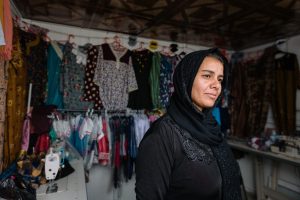

Your browser is not up to date.
If you wish to view the Action Against Hunger website correctly, update your browser.
Find the latest versions of supported browsers listed below.
No matching results…
No results seem to match what you are looking for, please modify your search.
 © Sébastien Duijndam
© Sébastien Duijndam Embedded
Many people who told us their stories remain scarred. Ameera has been living here for 4 years, she is in her twenties and she recalls: ͞ “I was pregnant when I fled to the mountains. I have seen children die of hunger and thirst. I lost contact with my husband while fleeing, because I was not with him when leaving. Fortunately, we found each other afterwards but I lost everything that day. We were happy before, we had a farm and a house.͟” Today Ameera has opened her own beauty salon in the camp. Her husband, who is sick, cannot help her to support the needs of the family. They still do not know if they will be able to return home one day, or in what conditions.
Today the conflict has finished, officially as of December 2017; there are still close to 2 million people displaced from their homes. 3.9 million have been able to return home, but the conditions they are returning to are often poor: destroyed water networks, devastated fields, lack of health services in both rural and urban areas. Only 30% of the remaining displaced consider being able to return home by the end of 2018. Those who return often do not have enough resources or savings to start their lives again. Having left everything behind, they find nothing but destruction and few prospects for the future.
Some have decided to wait a little longer in the camps that were created to accommodate them or in makeshift, rented accommodation on the outskirts of towns, that often costs far too much.
However, in a post-crisis context, with a competitive employment market strongly in decline, finding a job or a source of income is a challenge. To respond to this situation, Action Against Hunger, with the support of RDPP, have developed a twofold employment creation programme, enabling the more vulnerable to start earning again, whilst providing psychological counselling, helping them overcome their traumas and restoring their self-confidence.
Ameera was one of the 150 people from the displaced populations, local communities and Syrian refugees who have been supported to create their own enterprise or become apprentices in local trades. She chose beauty treatments because she worked in this sector before her displacement, just like Yasir, a pastry chef and Syrian refugee who left his country with his wife in 2011. For six years he has worked as a day labourer on small construction sites. ͞“I was a pastry cheffor 11 years in Syria, I can go back to my trade again, it is like a dream come true͟” he explains.
Others, like Rundik – 24 years old, from Iraqi Kurdistan – had no previous work experience. Disabled by a misshapen hip, she had to leave school to work to pay for her medical treatment. She is now an apprentice in a confectionary factory with her brother who has also benefitted from the programme. Between the two of them, they provide for their parents and their relatives. Rundik hopes to be operated on soon.
Tailor, barber, seamstress, head chef, pastry chef, warehouseman, telephony store employee, cattle breeder; the trainings offered were diverse and adapted to the local labour market. In total 54 people have started apprenticeships and 102 have opened a business.
Apart from the technical training, support and psychological counselling has also been provided. As Andrea Bigio, the Project Manager overseeing this program, explains, ͞“When you carry out this type of project, you need to consider the different needs of the people. It is not only about technical needs such as money to start a business, but also about theirpsychological and emotional needs. We all need special support after a crisis to be able to face the difficulties and be able to begin our lives again.”
To him, the project helps not only individuals, but society to move forward,
"Working together allows us not only to make an individual impact but also to strengthen social cohesion between the different communities"

When faced with a future where returning home is uncertain for displaced Iraqis and Syrian refugees, building relationships based on trust is essential to preventing tensions and contributing to living together peacefully. ͞To be able to start to live again, being an active member of a community is very important to them and their place in the community. We have noticed a huge improvement in their self-confidence.”
This project is supported by the European Regional Development and Protection Programme (RDPP).
Iraq
All the news of our Action: articles, events, testimonials, press releases…